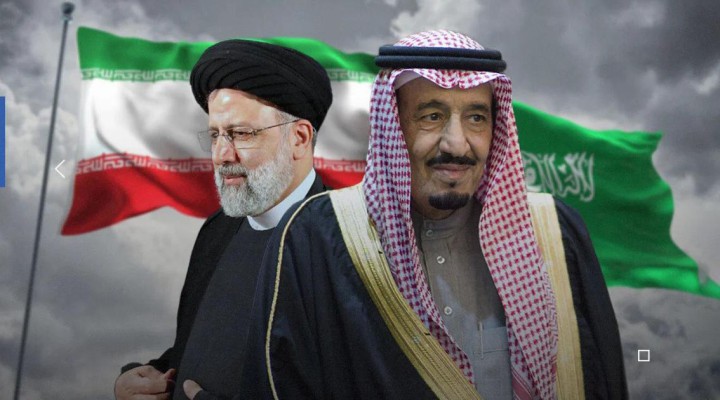Raisi to Riyadh

The Iranian-Saudi reconciliation is proceeding apace — but the US could still try to sink it
The Saudi-Iranian entente launched by the signing of last week’s Chinese-sponsored bilateral agreements quickly moved towards the full normalisation of relations and ‘zeroing’ of all problems between the two sides after decades of political and military quarrels.
The invitation sent on Sunday by King Salman to President Ebrahim Raisi to visit Saudi Arabia, and his immediate favourable response, shows both countries’ leaders are keen to press ahead with implementing the terms of accord — and belies claims about a 60-day ‘trial period’. Their meeting could set the seal on a host of understandings (which have probably already been largely agreed upon) on bilateral and regional issues including the Yemen war, Lebanon, lifting sanctions against Syria, and supporting its reconstruction via the gateway of the Arab summit Riyadh is to host after Ramadan.
This accelerated progress in relations between the Middle East’s two biggest powers can be expected to have far-reaching repercussions in the region and wider world, including:
— Restoring a measure of cohesion to the Islamic world and effecting a broader Sunni-Shia reconciliation that foils US and Israeli schemes to deepen rifts and incite sectarian strife.
— Closing the door to Israel’s hopes of expanding the circle of normalisation with Arab states and bringing Saudi Arabia and other countries into it. We have seen how Saudi Arabia denied visas to an Israeli delegation to attend an international conference in al-Ula, and the UAE suspended cooperation agreements and arms deals with Israel and offered $3mn to help rebuild the pogrom-ravaged town of Hawera, an important symbolic step.
— Accelerating the termination of the era of US hegemony in the region that has lasted since the Second World War, and the ascendancy of the China/Russia/BRICS partnership as the main feature of a new world order in both economic and military terms and an alternative to NATO.
— The most important clause in the agreement is the one reviving the 2002 security cooperation agreement between the two sides. It means abandoning all US plans to turn Israel into the Gulf states’ regional ‘protector’ from a putative Iranian threat. It could have the reverse effect, with the two countries cooperating against the Israeli threat. It will no longer be possible to use Iran as a bogeyman to frighten the Gulf states, or so it is to be hoped.
— The convergence of Saudi and Iranian interests on the need to find permanent solutions to all contentious issues through dialogue. Iran faces threats from the US and Israel over its nuclear programme and needs to focus on countering them. Saudi Arabia wants a way out of the costly trap of the Yemen war so it can pursue its ambitions to become a major economic financial hub and reduce its dependence on oil.
— Saudi Finance Minister Muhammad al-Jadaan’s remarks about Saudi Arabia’s willingness to invest billions of dollars in the vast Iranian market signals a major change in priorities, giving concrete interests precedence over historic political and ideological disputes and turning a new leaf.
— The return of the central Arab cause of Palestine to its prime place in the concerns of the Arab and Islamic worlds and their institutions including the Arab League and the Islamic Cooperation Organization.
Raisi’s arrival in Riyadh, most likely to a warm reception by the Saudi monarch, will mark the end of one era and the start of another not just in the Middle East but the entire world, with the retreat of US hegemony and the rise of a multipolar new world led by China.
Iran’s advances in military production (including missiles, drones, submarines and nuclear programmes) may constitute a key area of future cooperation, bringing an end to the regional arms race that for decades has benefited nobody but the US and other Western countries.
China stands to gain the most from this major breakthrough and the restoration of regional peace in the Middle East. President Xi’s visit to Riyadh in December, where he took part in three summit meetings (with Saudi, Gulf and Arab leaders) was not aimed at selling arms but sowing the seeds of change in the region whose fruits we already begin to see.
We can now anticipate a breakthrough in the Yemeni crisis that leads to a peace between Riyadh and Sanaa that upholds the current status quo on the ground, the lifting of sanctions on Syria as part of a comprehensive deal, a breakthrough in the Lebanese crisis and the election of a new president, and a visit to Riyadh soon by Syrian President Bashar al-Aqsa.
Despite this optimistic outlook, we must bear in mind that the US and Israel could try to sink this ship by going to war and trying to reimpose their hegemony by force. This cannot be ruled out. The US is like a wounded tiger. It is failing in Ukraine and still licking its wounds from its humiliating defeats in Afghanistan, Iraq, and Syria.
Five years ago in this column, I advised readers to get their children to learn Mandarin as the langue of the future. To this, I would now add the Farsi language while urging Iranians to teach their children Arabic in order to consolidate the culture of peace, dialogue, and cooperation and rise to the challenges facing the region and the world.
https://www.raialyoum.com/raisi-to-riyadh/
 TheAltWorld
TheAltWorld 
0 thoughts on “Raisi to Riyadh”